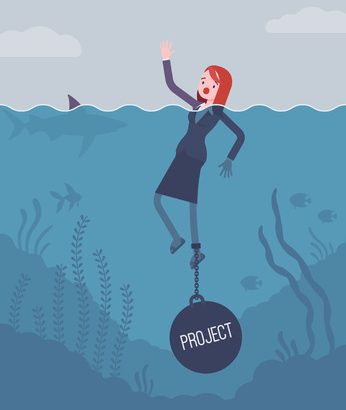Podcast: Play in new window | Download
Subscribe: Spotify | Email | TuneIn | RSS
It’s inevitable. At some point in your research career, you’re going to get that sinking feeling.
Your experiments will all fail, your PI will get on your case about finishing that paper, and your graduation date will drift maddeningly out of reach.
So what can you do when your research starts to drag you down?
Coming Up for Air
This week on the show, we share some practical advice from the Academic Mental Health Collective on ways graduate students can get going when the going gets tough.
Stress, anxiety, and depression are inevitable in your graduate training. At least they were for us!
At the same time, these painful emotions can be a valuable signal that it’s time to step back, take stock of your situation, and ask for help. There are resources on, and off, campus to help you through the hard times.
By thinking ahead, you’ll meet your training challenges with a tactical plan and a team of supporters to help you through. It does get better, we promise!
The Check is in the Mail
Science in the News brings us the story of a New York court’s $15 million judgement against Sci Hub, the online research paper pirate ship. We explore the legal and moral implications of the action, and make bold predictions about the future of scientific publishing.
If you’re interested in the history of academic publishing and how we got into this quagmire in the first place, we highly recommend Stephen Buranyi’s Guardian piece titled: Is the staggeringly profitable business of scientific publishing bad for science?
We also celebrate the beginning of summer by breaking our IPA fast. We’re drinking the Nectar IPA from Humboldt Brewing Company. This golden beauty has a sweet start and a bitter finish, sort of like my first marriage!*
(*Yes, this is a total lie, but the setup was perfect and impossible to resist. Sort of like my first marriage!**)
(**Okay, I’m done.)

I just finished listening to episode 75. I’m two years in and it’s been a really tough year for me struggling with the constant juggle of classes, research, and other requirements along with some serious imposter syndrome. I really appreciated the reminder that everyone goes through this. The survey results about career happiness post-PhD was particularly heartening.
Thank you!
The only thing worse than struggling with classes, research and imposter syndrome is the isolating belief that you’re the only one struggling! Thanks for taking the time to join the conversation, and please share any resources you find to help you manage the ‘juggle.’
O.M.G Loved this episode. Overall, I want to say, as many have said before me, thank you. By listening to your podcast, I have really started to see how knowing that other people are going through the same struggles as me is beneficial; I’ve heard people say that before, but never really got it or felt it until now: You guys talk about how hard grad school is, how it was a struggle for you, people write in to say it was hard for them, too and it’s been hard for me (fear of failure, imposter syndrome, learning new things, uncomfortable situations during rotations etc). But what has really helped me, is hearing this and then thinking about the other challenges I’ve faced during graduate school: I had two kids (now 3.5 and 1.5 years old), I was diagnosed as bipolar AND we moved to a new state for my husband’s job, so I’m continuing my work in a new lab, with new people and a new “on site” mentor. All in the space of the four years I’ve been in grad school. After listening to all the episodes, it’s gotten easier to say “you know what? You did good, girl! You got an NSF fellowship in your first year. You dealt with all that mental illness stuff, you’re life was uprooted and complicated by moving and having kids, and you’re going to graduate in a year! You did good.” All of the things you guys outlined here are things that I had to do to survive. I needed to get mental health support, I needed to change my relationship with my mentors, I needed to slow down, I was only allowed to do one thing at a time, I allowed myself to be realistic about what I was going to achieve and lowered my standards to arrive at expectations that are normal and on par with what I imagine others’ expectations of me are. So thank you for helping me cut myself some slack, helping me realize that I can stop discounting how hard I’ve worked to get here, and be confident enough to go for what I want (I always thought I was never good enough- didn’t deserve to try- to become a PI, but now I know, looking back on what ground I’ve covered, that I can embrace that goal and work toward it.) Thanks 🙂